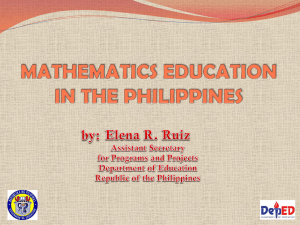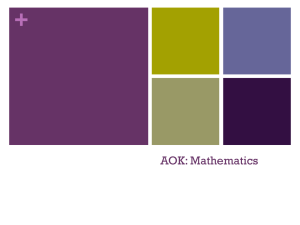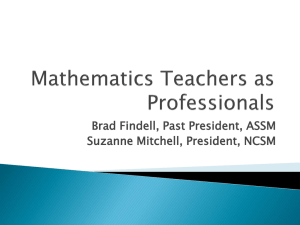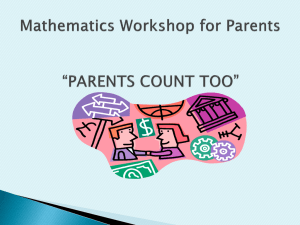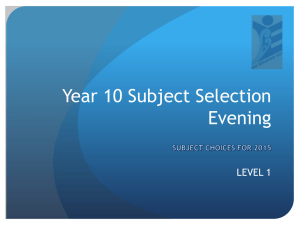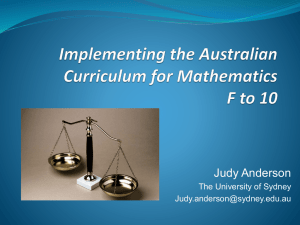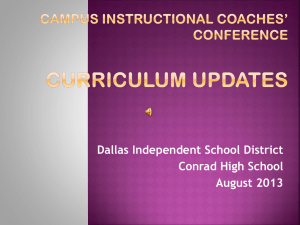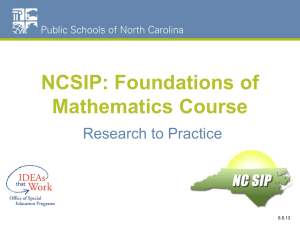Math Teacher Leadership
advertisement
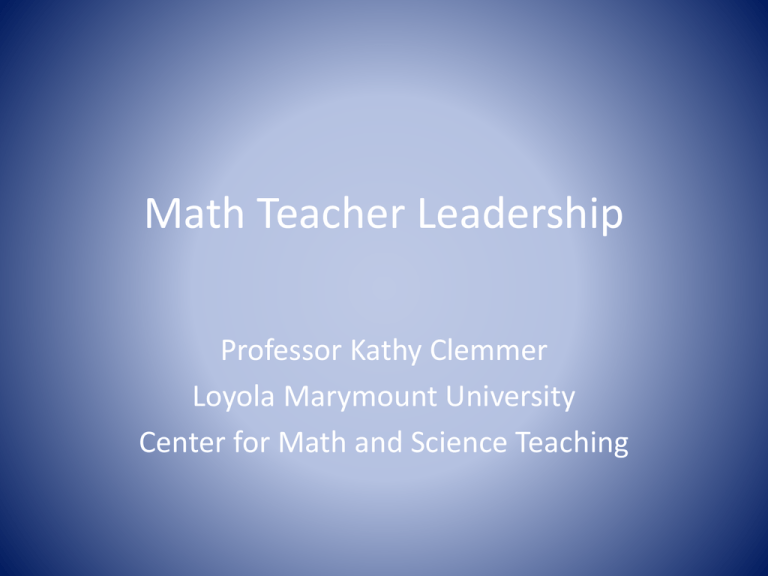
Math Teacher Leadership Professor Kathy Clemmer Loyola Marymount University Center for Math and Science Teaching Who do you identify with in this clip? Describe the attributes and core competencies for a • Math Teacher • Coach • Administrator Who exemplifies these attributes and core competencies in the clip? One Definition of Leadership Leadership is influencing people by providing purpose, motivation, and direction while operating to accomplish the mission and improve the organization. Army Leadership, Competent, Confident, and Agile, FM 6-22, 10-2006 Where does the Math Teacher Leader fit? Are you “Frodo”? Transformative Teacher Leadership Attributes of a Math Teacher Leader: • Value driven • Goal-oriented • Vision-directed Core Competencies: • Teaching students, teaching adults, coaching adults Transformative Leadership is Value-Driven LMU-Center for Math and Science Teaching (CMAST) Teacher Leader values: • Math or Science as an exuberant way of life • Passionate belief that all students can learn mathematics and science • Aggressive and positive perseverance through challenges • “Those that know, do. Those that understand, teach.” –Aristotle • “Science is not only a discipline of reason but, also, one of romance and passion” • –Stephen Hawking What are your values for teacher leadership in mathematics? Transformative Leadership is Vision-directed • Visions involve passion, and the passion of leaders is often intense • Vision empowers a leader to – Inspire and motivate others, – To turn ideas into actions • Vision engages the heart and spirit MAST TL’s drive their vision to realize powerful results for student engagement and achievement Learning to Lead, A Workbook on Becoming a Leader by Warren Bennis & Joan Goldsmith (2010) Math and Science Teaching (MAST) System Mission Teaching and learning that equally values students and rigorous mathematics and science as the core of the system, requires teachers to make connections, uses mathematical and scientific reasoning within the context of storytelling and designs an experience for the learner that is active, connected, sensory, and emotional; thereby inspiring and motivating students to learn and achieve in mathematics and science. What is your vision for teacher leadership? Transformative Leadership is Goal-oriented • Values provide the context • Vision provides the expected final outcome – Culture • Goals provide the tools – Teaching • Describe the practices you use “to teach” – Coaching • Describe the methodology you use to coach Draw yourself implementing your vision through your values and highlight the connections to teaching and coaching WHO ARE YOU? Who are Leaders? “Leaders are purveyors of hope. Their optimism communicates a belief in the worth of followers and the talents of those around them” Learning to Lead, A Workbook on Becoming a Leader by Warren Bennis & Joan Goldsmith (2010) Transformative Math Teacher Leaders “To Be or Not to Be, That is the Question” The role of Transformative Teacher Leadership in Mathematics TL’s Embrace failure as part of learning and Seek to implement Systemic Solutions Why is this role necessary? • Once a leader in math and science education, the United States now is far behind other countries. Out of 33 industrialized nations, America ranks 27th in math (OECD, 2009) – Finland is first and Brazil is last • The United States also trails at least 19 countries that produce more scientists and engineers. Workforce projections for 2014 by the U.S. Department of Labor show that 15 of the 20 fastest growing occupations require significant science or mathematics training to successfully compete for a job. What experts are recommending "Teachers don't just have to learn more math and science, they need to learn to become an expert resource for their colleagues.” Joyce Evans, a program manager in NSF's directorate for education and human resources. A November 2010 NCATE (National Council for Accreditation of Teacher Education) report calls for a shift in teacher training programs toward models that are fully grounded in clinical practice with varied and extensive opportunities for teachers to connect what they learn with the challenge of using it, under the expert guidance of skilled clinical educators. Transforming Teacher Education Through Clinical Practice: A National Strategy to Prepare Effective Teachers California’s Response Mathematics Instructional Certificate • The program provides extensive opportunities for candidates to – demonstrate mathematical and pedagogical content knowledge and skills to support effective mathematics instruction and student learning. – Coursework and fieldwork address the complex interplay of math content and pedagogy in effective teaching. – Candidates are prepared to enhance mathematical development for all students – Candidates are prepared to collaborate and co-teach with other math teachers as well as teachers of other subject matter disciplines. – Candidates are prepared to teach K through Pre-Algebra or K through Algebra I. – Candidates are equipped to understand the challenges of developing mathematics literacy among California’s diverse student and teaching population. MICMIL Mathematics Instructional Leadership The program includes a planned process for the comprehensive assessment of candidates in the following areas: 1.Understand practitioner research and encourage teachers to use it in their practice 2. Design and implement professional development that engages teachers, administrators, and parents while promoting student engagement and achievement in mathematics 3. Analyze and use data to design solutions to the challenges of developing mathematical literacy among California’s diverse population 4. Lead a professional community of practitioners to promote student engagement and achievement in mathematics and minimize the achievement gap Who do you want “To Be” ?


